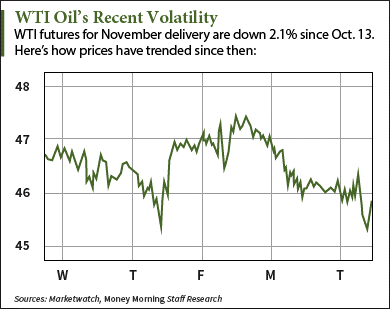 WTI crude oil prices today (Tuesday) fell 0.1% ahead of tomorrow's OPEC meeting and today's expiration for November futures contracts.
WTI crude oil prices today (Tuesday) fell 0.1% ahead of tomorrow's OPEC meeting and today's expiration for November futures contracts.
WTI crude oil prices closed at $45.55 a barrel for their second consecutive down day. That marks the lowest settlement in more than two weeks, falling past yesterday's $45.89 close. WTI futures have posted losses in five out of the last six trading sessions.
Brent crude oil prices rose 0.2% to $48.71 a barrel. The international benchmark has fallen 2.4% in the last week but gained 1.1% so far this month.
Here's why WTI crude oil prices are down today...
Two Factors Sending WTI Crude Oil Prices Lower Today
The first reason WTI crude oil prices are down today is the expiration of WTI futures contracts for November delivery. When futures expire, traders tend to "book-square" - the process of hedging contracts to reduce exposure to the market. Investors take a square position when they're uncertain of how next month's futures will perform. That can cause a slight sell-off in prices.
Another reason for today's decline in oil prices is tomorrow's OPEC meeting. However, the discussion between cartel and non-cartel producers isn't garnering attention since the larger producers don't plan on reducing output. Saudi Arabia - the de facto leader of OPEC - calls it a "technical meeting" due to Venezuela's months-long push for a sit-down.
"The reason the market pretty much shrugged the news off was because the idea was spearheaded by Venezuela, who has very little influence in OPEC," said Tyler Richey, co-editor of market research website The 7:00's Report, to MarketWatch. "It is well known they are hurting the most financially from the decline in oil prices and therefore, are desperate for an oil rally."
But there's another larger producer gearing up for an OPEC meeting.
And Money Morning Global Energy Strategist Dr. Kent Moors says this meeting could save many countries from economic collapse...
Will Russia's Meeting with Saudi Arabia Affect WTI Crude Oil Prices?
On Oct. 3, Russian Minister of Energy Alexander Novak announced that his country is ready to meet with OPEC to discuss the crash in oil prices. Reuters reports the OPEC and Russia meeting is set to occur at the end of October.
Although the two have long been enemies, this meeting could be an opportunity for Russia to convince OPEC to temporarily cut production.
You see, overproduction has been a huge problem for OPEC this year. On Oct. 12, the cartel reported it produced 31.6 million barrels a day in September. That's well above the proposed cap of 30 million barrels a day. It was also the highest monthly output in over three years.
Since other cartel members are flooding the market with excess supply, the Saudis are increasing output to maintain their revenue share.
"The Saudis cannot prevent other OPEC nations from raising volume in a desperate attempt to collect revenue," Moors said. "So they need to appear to be leading the effort."
[mmpazkzone name="in-story" network="9794" site="307044" id="137008" type="4"]
At the meeting, Russia could persuade Saudi Arabia to lower production while Russia boosts production. Saudi Arabia cutting production would ease the tensions of the other suffering OPEC member countries, like Libya and Venezuela, which are readying for a political revolt. It would also allow Saudi Arabia to demonstrate its leadership abilities to other members.
The cutback in production would ease the glut and cause prices to bottom out. From there, they can begin their long-term rebound as demand increases into 2016.
"That should be enough for crude prices to find a floor and improve," Moors noted.
Alex McGuire is an associate editor for Money Morning who writes about energy. Follow him on Twitter for all of the biggest oil and gas updates.
More on Energy: Master limited partnerships (MLPs) have seen immense growth over the last decade. But it's important to understand how they work. Here's how you can profit from the MLP sector, which has generated 249% in total returns since 2005...


